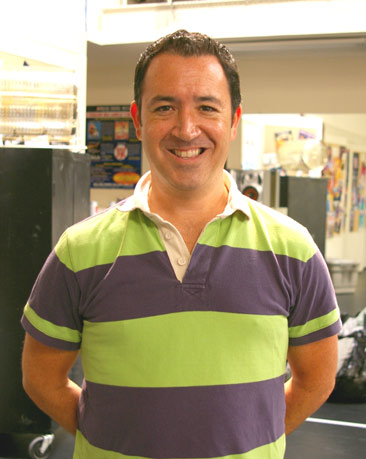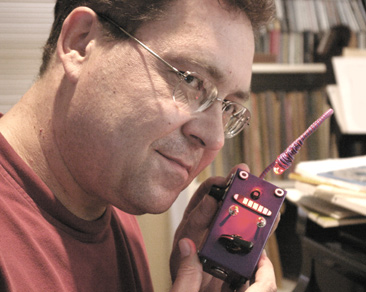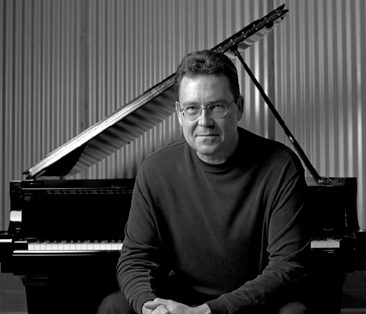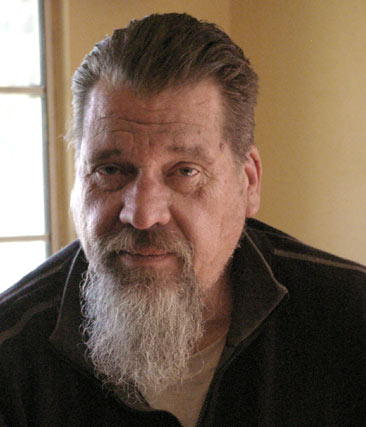Mar 13 2009
My Pod-o-Matic Podcast Channel
Artists, cultural leaders, musicians, business owners, and others talk with me about arts and culture in Long Beach.
Mar 13 2009
Artists, cultural leaders, musicians, business owners, and others talk with me about arts and culture in Long Beach.
Sep 08 2008

Steven Glaudini speaks about the upcoming 08/09 season, and shares his insight into the challenges and opportunities of presenting world class musical theater.
Jun 10 2008

What do jazz greats like Luis Conte, Lee Ritenour, Eric Marienthal, Tom Scott, and Ernie Watts have in common? Long Beach native son David Witham has lent his talent and artistry to each, and many more. He’s the principal pianist for Wicked at the Pantages Theatre in Hollywood, and was the long time band leader for George Benson.
He recently released a CD of original compositions titled Spinning The Circle on the Cryptogramophone label. The playing is stellar, and the writing diverse: In turns expansive, reflective, and joyous. Supported by top musicians like Nels Cline (Wilco, John Zorn, Geraldine Fibbers), Jay Anderson (Maria Schneider, Frank Zappa, Tom Waits), Jon Crosse (Captain & Tennille, Michel Columbier, Paul Anka), Greg Leisz (Willie Nelson, Beck, Joni Mitchell), Scott Amendola (Pat Martino, Charlie Hunter, Nels Cline), and legendary percussionist Luis Conte (Queen Latifah, Diana Krall, Eric Clapton), David’s playing and writing glistens and shines.
David’s not a one trick pony, though. In addition to his full time music work, he also produces a public access show called Portable Universe. With more than 100 episodes, he’s showcased a wide variety of artists, musicians and, with the help of Neon Hunter, explored his other passion: Neon art.

David took some time to speak with me about his work, and performed two songs. Click on the Podcast link to hear the interview, and on the video player below to watch the performance.
Here’s a video of David performing two original songs:
Watch Portable Universe Fridays at 8:30 pm on Long Beach Community TV (ch. 65/69/95 in LB and Signal Hill if you have cable) and 24/7 at www.portableuniverse.tv.
Apr 11 2008

Raindog Armstrong is a poet, publisher, and pied piper for poetry. With his Lummox Press, he published the Lummox Journal as a monthly magazine, which showcased artists from around the country, and around the world. Publishing both poetry and in-depth interviews, the Journal has now moved onto the internet. This has freed him, at last, to publish the first of several volumes of his own work, the first of which is called Fire & Rain. It reaches back to some of his earliest work, and spans nearly 15 years of creativity.
Raindog joined me for a free wheeling, and wide ranging, conversation that includes three poetry recitations, discussions of 9/11, and his past and future musical efforts. It is 50 minutes of honest talk with one of our fair City’s creative icons.
If you can’t commit to listening to an hour-long conversation, you can hear all three of his poems:
Traveling Man (an homage to Charles Kuralt)
Also, you can see a brief video of Raindog reciting Eyes Like Mingus:
Jan 12 2007
by Sander R Wolff
The Long Beach Union
(This interview was published sometime in the early 1990’s)
Next Saturday, March 28, McCabe’s (3101 Pico Blvd. in Santa Monica) will be presenting Peter Blegvad and Peter Holsapple. I spoke with Blegvad by phone as he was wrapping up concert dates on the East Coast. Holsapple is recently departed from the pop band REM and previously of the db’s.
“He’s a multi-instrumentalist of rare talent,” Blegvad said. “He’ll be playing guitar, mandolin, piano and also accordion. He’s just a fantastic accompanist, not to mention he’s also a song writer of the highest caliber himself. We’re doing some of his songs too.”
Jan 12 2007
Published in the Union Newspaper on 9-11-92
by Sander R. Wolff
They are rebels with a cause. Their mission is to commission challenging new works from innovative composers and bring them to the world. Since 1973, when the Kronos Quartet began, the have been redefining the cutting edge and eliminating the restrictions placed on the traditional string quartet. They’ve worked with the big three modern classical minimalists: Terry Riley, Steve Reich and Philip Glass, but they are always on the prowl for exciting new works by relative unknowns as well.
“As a matter of fact,” said David Harrington, 1st violinist and spokesman for the group, “we’re opening out concert with just such a piece and its called ‘Yiddishbbuk’ by a composer I’d never heard of until August. His name is Osvaldo Golijov. Its a stunning work.”
Golijov was a Fellow in composition at the Tanglewood Music Center in 1990. Earlier this year, while Kronos was performing at Tanglewood, Harrington came upon some written material by Golijov.
“It struck me that here was someone that, the way he spoke about his own work and music, attracted me immediately,” said Harrington. “I got his address and he sent me some tapes and immediately this piece just leapt out.”
The Kronos Quartet changed the entire program for their European tour so that they could include the piece.
“We try to be ready for an unexpected discovery at any point, and I know we tend to drive people who print programs slightly crazy because we’re always changing them up to the last moment but, in this case, I think it was worth any ink that may have been spent.”
Jan 12 2007
by Sander R Wolff Steve Hackett has a new band and, in addition to performing old favorites from his numerous solo releases, will be premiering new material. He’s at ease playing progressive rock, pop, classical solo acoustic, Japanese koto and the blues. He balks at classifying his music, although he says that ‘Guitar Noir’ may come closest to describing what he does. His newest album, Time Lapse, was recorded live and features many of his best pieces from the last 17 years. “We have a 4 piece, paired down,” Hackett said in a phone interview. “It’s not the same guys that are on the album. We have Julian Colbeck, who’s on Time Lapse, but a new rhythm section and the rhythm section is dynamite. I’m very pleased about that” Joining them will be Dave Ball on bass and Hugo Degenhardt on drums. “It’s great to have a band again. It’s like, for years I’ve been doing tours with an acoustic guitar. I’ve been doing classical things. I’ve done things with orchestras, live things, but I hadn’t had a band for quite some time and it makes you realize… I think I was away from it for so long, it’s a bit like when something is withheld from you rather than personal choice. I think it was all part of a divine plan to make me hungry for it.” During his ‘acoustic’ period he released Bay Of Kings, and then had the opportunity to play a big festival in the U.S.S.R., with close to 90,000 people in attendance. The other acts played rock and roll and sang their lyrics in English. ‘The audience didn’t have a clue what was going on. There were all ages in the audience, from tiny tots to grandmas, and I played a piece of Bach right at the end and they all went absolutely bananas because I think they knew the piece. I managed to convert these people, as it were. Where rock had failed, music without props had succeeded.
The Long Beach Union
Published 9/8/92
Jan 12 2007
Author, Playwright and Mystic
Talks about the Nature of Reality
by Sander R Wolff
The Union
Published 12/10/90
He’s written countless books, both fiction and nonfiction. Personal change, quantum physics, mysticism, conspiracy and James Joyce are reoccurring themes in many of his works. Robert Anton Wilson, armed with humor, soft-spoken enthusiasm and a keen mind, has carved out a place in literature that really didn’t exist before. His fiction doesn’t fit easily into any category.
Wilson’s first historical novel, Masks of the Illuminati, is set In England in the late 1800’s. It’s the tale of Sir John Babcock who demonstrates that a little knowledge is a dangerous thing. By claiming to have an understanding of the occult information coded into Clouds Without Water, a privately printed book of sonnets, he unknowingly enters into an initiation process.
“Initiation is always the attempt, sometimes more successful sometimes less, but always an attempt to create a new Imprint,” Wilson said. “Primitive initiations, by and large, are more effective than the ones in the modern world because so-called primitives are willing to go a little bit further with those things. If you read up on the initiation rites of African tribes or native American tribes you’ll see the attempt is to create a powerful shock that will create a new imprint, to create the same chemical releasers in the brain that a near-death experience would create.”
In Masks, Babcock believes he is being initiated into a Grand Lodge of Free and Accepted Masons, an ancient fraternal organization. Little does he know that he’s being manipulated by The Beast, Master Therion, 666, the drug-crazed sex fiend Aleister Crowley. Wilson has studied Crowley’s work in depth and had a few observations.
“There are essays and letters by Aleister Crowley that make it quite clear that he was trying to come up with a technique of initiation that would be a lot stronger than what Freemasons were currently using, and one of the things that Crowley wrote about was [that] it’s hard, in the modern world, because the candidate is pretty clear in his head that you’re not going to murder him, whereas in primitive conditions they think, ‘Jesus, maybe they are going to kill me. ’”
Jan 12 2007
by Sander R Wolff
Published in the The Union sometime in the late 1980’s
Birdsongs of the Mesozoic stretches the boundaries of live performance. They work as a quartet, and almost all of the music they play is scored, but there’s this thing, this edge, this dangerous line they walk between classical structure and an auto accident.
Most of their pieces go through changes. Bits are calm, beautiful even, with their standard set-up of guitar, piano, keyboard and sax, but it never lasts for long. They switch back and forth, each playing drums, saxophonist Ken Field going between synthesizer and flute.
“So the fact that any one piece sounds like it has a lot of different styles in it is strictly due to the multiple personalities that the particular composer has,” Field said.
The second cut off their current Cuneiform C.D., Faultline, is “They Walk Among Us.” It has drumming that sounds a lot like “When the Levee Breaks,” and when asked, guitarist Martin Swope fessed up.
“Actually, all the things that Eric plays [on the piece] are sampled from the Beastie Boys, which are samples they stole from other people. The idea was if it was laundered through the Beastie Boys, it would be ok to do,” said Swope.
“Maybe I Will,” Rick Scott’s only composition on the record, jumped out at me when I first heard it. It’s complex, with a lot of interplay between the instruments. But again, there was this thing… just 4 notes in the whole piece.
“I work in the structure,” said Scott, “and also attempt to figure out how many melodic permutations that I can come up with to maintain peoples’ interest. I try to suggest some harmonic movement, even though it’s a little more dicey. I mean really, when you think about it, you’re dealing with a limited number of notes anyway, with 8 notes or 12 notes maybe. Probably not 12, maybe 11, so changing that to four is really just a matter of degree.”
Despite the debate on the number of notes, these guys really know what they’re doing. They’ve existed as a group for almost 10 years, and have been touring extensively on the East Coast. This tour is their first to the West Coast (having discovered that they could fly their equipment for free) and, after tomorrow’s concert at Bogart’s and Wednesday’s show at Club Lingerie in Hollywood, they’re gone.
So if you like challenging music, you’ll love these guys. This Great Religion will open the show, so get there early. And you know that you’ll see me there!
Jan 12 2007
by Sander R Wolff
The Union
Published some time in the early 1990’s
As I sat, watching and listening to The League of Crafty Guitarists perform Sunday at Peppers in The City of Industry, I was struck by the eyes of the players; gazing into space, unfocused. They seemed the perfect example of calm assurance, sitting on folding stools, with perfect posture. When not playing, resting their left hands on their knees palm up and their right arms hanging at their sides.
I spoke at length with Paul Richards, a member of the L.C.G., and he told me of the Guitar Craft school, created by King Crimson founder Robert Fripp. Richards began the Level One course in ’86, and except for breaks to complete his college education, has continued studying and performing under the direction of Fripp.
“I knew that Robert had a different approach than a lot of other guitarists, more of an intellectual approach or maybe even a spiritual approach to playing the guitar,” Richards said. “The best thing [was] trying to let go of all that and just go for it, because actually when I came to the course it wasn’t anything like I could have imagined anyway.
“During that [first] week, the focus is on technique, on how to play the guitar rather than what to play, so there are a number of exercises that are presented, right and left hand techniques. In addition to that there are exercises in attention that are presented to develop and cultivate attention. It’s a beginning for developing a personal discipline in practice.”
The focusing of attention is central to the Guitar Craft training, and the work involved in learning the specific techniques moves beyond mere guitar playing.
“Everything is geared toward this type of work. Besides playing the guitar all day we each take our turn in helping prepare the meals and [taking] care of the house, things like that. This is also part of the course. Part of the Level Three course is to apply the same quality of attention and work we apply to our guitar playing to an ordinary mundane activity like cleaning the toilet or sweeping the floor or chopping onions for a meal. So it expands, in that sense, from just being a guitar player to doing things in general. At one point Guitar Craft becomes a way of life.”